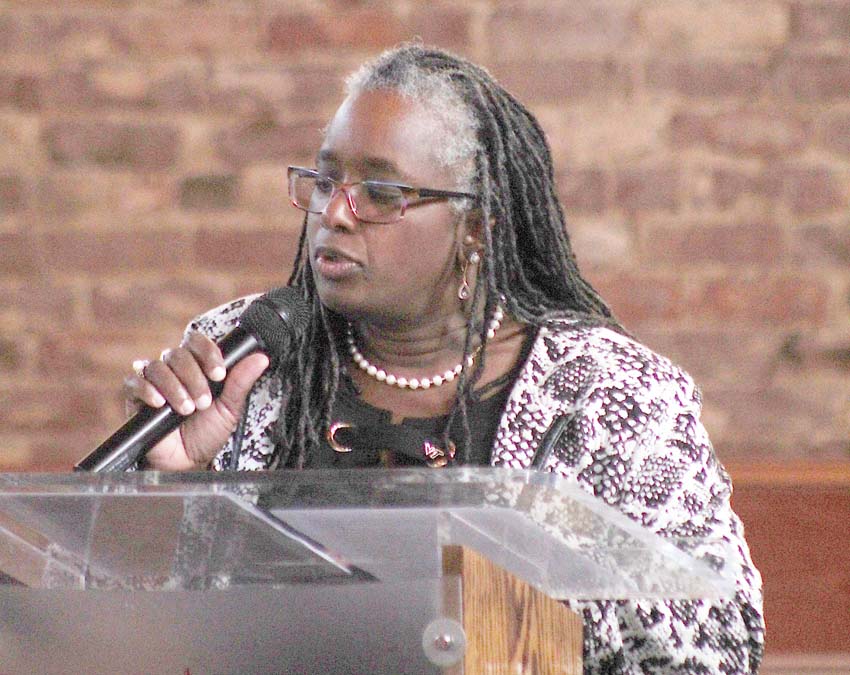“A Black Woman from Cotton Picking to College Professor’
By: SEMORIA MOSLEY
Mar 29, 2019

Dr. Menah Pratt-Clarke speaks at Claflin’s Women’s History Month Luncheon on March 25 in Ministers Hall. (Panther photo by Semoria Mosley)
Claflin’s Women’s History Month Luncheon was held March 25 at Ministers Hall with Dr. Menah Pratt-Clarke as the keynote speaker.
Pratt-Clarke serves as the vice president for strategic affairs and diversity at Virginia Polytechnic Institute and State University (Virginia Tech). She is also professor of education in the School of Education in the College of Liberal Arts and Human Sciences, with affiliations in Africana Studies, Women’s and Gender Studies and the Department of Sociology.
After an introduction, Pratt-Clark read excerpts from her most recent publication, “A Black Woman from Cotton Picking to College Professor: Lessons about race, gender, and class in America.”
Pratt-Clarke published the autobiography of her mother this year, though her mother died in 2012. The autobiography follows Dr. Mildred Pratt’s journey of transition.
“What do we learn from the journey of a black woman who grew up picking cotton in the 1930s in rural Texas as one of eight siblings in a single-parent sharecropping household, who became a full professor of social work at a time when less than 1% of professors were black women in the 1970s?” Pratt-Clarke asked the audience.
“We learn about the power of the powerless,” Pratt-Clarke said. “Although life for her ‘ain’t been no crystal stair,’ like the mother in Langston Hughes’ poem, she continued to climb the rough and dirty stairs of life and did not let her childhood events define her, undermine her or deter her. Rather, they fueled her determination to ‘make a way out of no way,’ to survive, to thrive, and to lift others as she climbed.”
To accompany the excerpts, Pratt-Clarke used a PowerPoint equipped with wrenching images of her mother’s past. The publication was selected for a 2018 American Education Studies Association Critics’ Choice Award. Hereare excerpts from the publication.
“… Mildred’s family was not always poor, nor was the experience of her immediate family replicated throughout the extended family. Mildred’s family had owned land in Texas almost since their arrival there, and some of them were quite prosperous. Mildred believed that some family members received land as a consequence of the ‘40 acres and mule’ proposal. But the actual plan (General Sherman’s Field Order # 15) was almost the possibility owning the land they had always and were still working. Still, it is the case that public lands were sold to former slaves.
“It is, however, clearest in this narrative that the Thirkill side of the family was part Native American: grandmother, Rosa Thirkill was half Indian and half White. Given that her roots were in Alabama, which was formerly primarily ‘Indian Lands’ before becoming a state, it is not surprising. And even if they had been the slaves of Indians, rather than descendants of them, they would have been entitled to land.
“Mildred’s mother and siblings descended into deep poverty only after her father irresponsibly destroyed the family home by setting it ablaze to conceal evidence of his earlier theft of cotton. After the fire, Mildred’s father immediately relocated them and set them up as sharecroppers on someone else’s land. And in this case, and in all others, as soon as he moved them, he disappeared, leaving his wife and child to do the work and to support themselves …”